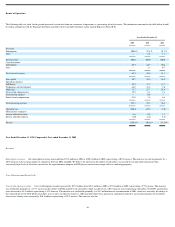NetFlix 2002 Annual Report Download - page 22
Download and view the complete annual report
Please find page 22 of the 2002 NetFlix annual report below. You can navigate through the pages in the report by either clicking on the pages listed below, or by using the keyword search tool below to find specific information within the annual report.
sharing agreements. As a result, once initial demand for a particular title has been satisfied, we may hold a number of titles in excess of the quantities needed to satisfy ongoing subscriber
demand. Several studios allow us to sell the DVDs acquired from them at the end of the revenue sharing term. Before we sell a particular title, we compare the number of copies we hold to
estimated future demand to determine the number of copies we can sell without jeopardizing our ability to satisfy future subscriber demand. From time to time, we expect to make bulk sales
of our used DVDs to resellers.
We recognize subscription revenues ratably during each subscriber’s monthly subscription period. We record refunds to subscribers as a reduction of revenues or deferred revenues, as
appropriate. We recognize revenues from the sale of used DVDs to resellers when the DVDs are shipped to the reseller. Historically, revenues from DVD rentals and shipping revenues also
were recognized when the product was shipped to the customer.
In addition to our standard service, we also offer subscribers other service plans and price points that allow subscribers to keep either fewer or more titles and range in subscription price.
Approximately 90% of our paying subscribers pay $19.95 or more per month.
Cost of Revenues
Cost of Subscription Revenues
We acquire titles for our library using traditional buying methods and revenue sharing agreements. Traditional buying methods normally result in higher upfront costs when compared to
titles obtained through revenue sharing agreements. Cost of subscription revenues consists of revenue sharing costs, amortization of our library, amortization of intangible assets related to
equity instruments issued to certain studios and postage and packaging costs related to shipping titles to paying subscribers.
Revenue sharing costs . Our revenue sharing agreements generally commit us to pay an initial upfront fee for each DVD acquired. Revenue sharing expense is recorded as DVD’s subject to
revenue sharing agreements are shipped to subscribers. Under certain of our revenue sharing agreements, we pay an additional minimum revenue sharing fee for each DVD shipped to a
subscriber. Other than the initial upfront payment for DVD’s acquired, we are not obligated to pay any minimum revenue sharing fee on DVDs that are not shipped to subscribers. We
characterize these payments to the studios as revenue sharing costs. As of December 31, 2002, we had revenue sharing agreements with over 50 studios.
Amortization of the cost of DVDs . On January 1, 2001, we revised the estimated life to one year and assumed a salvage value of $2.00 for the DVDs that we believe we will eventually sell.
Prior to January 1, 2001, we amortized our cost of DVDs using an accelerated method over an estimated life of three years and assumed no salvage value.
Amortization of intangible assets related to equity issued to studios . In 2000, in connection with signing revenue sharing agreements with Columbia TriStar Home Entertainment,
Dreamworks International Distribution and Warner Home Video, we agreed to issue each of these studios an amount of our Series F Non−Voting Preferred Stock equal to 1.204% of our
fully diluted equity securities outstanding. In 2001, in connection with signing revenue sharing agreements with Twentieth Century Fox Home Entertainment and Universal Studios Home
Video, we agreed to issue to each of the two studios an amount of our Series F Non−Voting Preferred Stock equal to 1.204% of our fully diluted equity securities outstanding. As of
December 31, 2001, the aggregate of Series F Non−Voting Preferred Stock granted to these five studios equaled 6.02% of our fully diluted equity securities outstanding. Our obligation to
maintain the studios’ equity interests at 6.02% of our fully diluted equity securities outstanding terminated immediately prior to our initial public offering. The studios’ Series F Preferred
Stock automatically converted into 1,596,415 shares of common stock upon the closing of our initial public offering. We measured the original issuances and any subsequent adjustments
using the fair value of the securities at the issuance and any subsequent adjustment dates. The fair value was recorded as an intangible asset
13
























